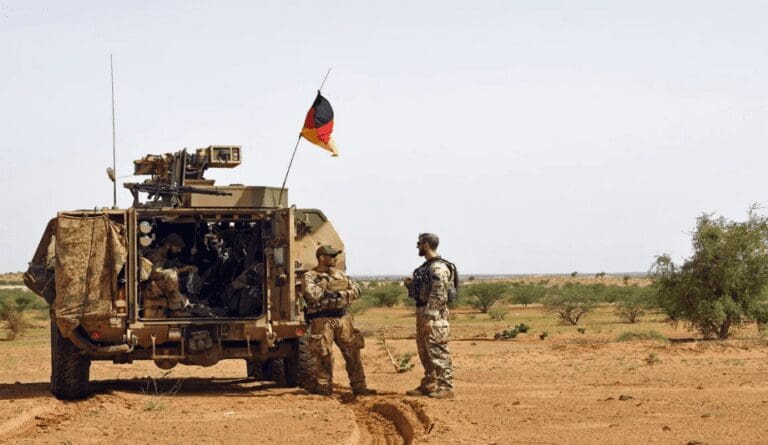The announcement was made on Wednesday, May 3, by the commander of the German contingent of MINUSMA, Colonel Heiko Bohnsack.
The Bundeswehr, the German army, has already begun shipping the first components of its military equipment deployed in Mali. This announcement comes at the same time as Berlin’s decision to extend the mandate of its troops in MINUSMA by one year for the last time.
This decision by the German government is still awaiting approval by the country’s parliament, the Bundestag. After a decade of presence, the withdrawal of German troops in Mali will be effective in May 2024.
During his stay in Mali in mid-April, German Defense Minister Boris Pistorius made the same announcement to the Malian authorities. This withdrawal of the German contingent comes against a background of disagreement with the authorities.
In August 2022, Germany decided to suspend “until further notice” most of its military operations in Mali, in protest against the restrictions of movement imposed by the Malian authorities on MINUSMA. Since then, the situation has not really improved, since the UN mission cannot fly its aircraft, particularly reconnaissance drones,
without authorization. On several occasions, these authorizations have not been granted.
The German contingent of nearly 1,000 peacekeepers in Mali – mainly based in Gao – has the primary task of gathering reconnaissance for the UN peacekeeping mission in Mali.
The German force commander of MINUSMA, Colonel Heiko Bohnsack explained that “in the first stages of the pullout, the equipment in place will be slowly thinned out, while the troops will retain all the means to carry out their mission.
Moreover, the German decision is also motivated by the coldness that has set in between the European Union and the Malian authorities who have decided to turn to Russia. The West continues to criticize the presence in Mali of “mercenaries from the Russian paramilitary group Wagner,” while the Malian authorities refer instead to “instructors deployed in the framework of bilateral state-to-state cooperation.”
In parallel with the start of the withdrawal of its troops from Mali, Germany has decided to participate in a new EU Military Partnership Mission in Niger (EUMPM Niger). This mission is intended to help strengthen the military capabilities of the Nigerien armed forces in order to support Niger in its fight against armed terrorist groups while respecting human rights and international humanitarian law. The EUMPM support to Niger will be part of the overall Nigerien-led capacity building plan.
Also, Germany wants at all costs to avoid the disillusionment experienced by its troops in Afghanistan, whose military operation initiated in 2001 was described as a “fiasco” even by Westerners.
The German contingent within MINUSMA is one of the largest after Chad, Bangladesh and Egypt.
In addition to Germany, other countries have also decided to withdraw their troops from Mali. These include Sweden, Britain, Benin, Ivory Coast, Egypt and Jordan.
Some fear that this trend will continue just days before the start of discussions on the renewal of MINUSMA’s mandate. Already, the mission has been greatly diminished by the air support provided by the French military operation Barkhane, which left Mali in August 2022, after a decade of presence.
In addition to having the highest annual budget ($1.2 billion), MINUSMA is also the peacekeeping mission that has suffered the most casualties in the world in recent years. Since its creation in 2013, more than 185 of its members have died in hostile acts.
MD/ac/fss/APA


